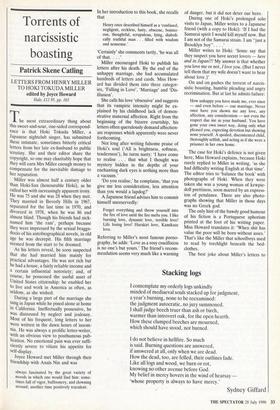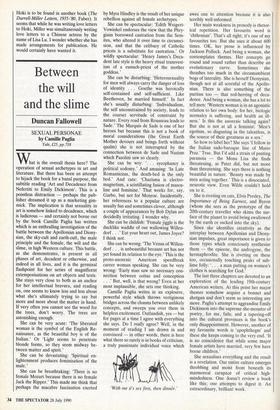Torrents of narcissistic boasting
Patrick Skene Catling
LETTERS FROM HENRY MILLER TO HOKI TOKUDA MILLER edited by Joyce Howard Hale, £12.95, pp. 163 The most extraordinary thing about this sweet-and-sour, one-sided correspond- ence is that Hoki Tokuda Miller, a Japanese nightclub singer, has submitted these intimate, sometimes bitterly critical letters from her late ex-husband to public scrutiny. She and their editor share the copyright, so one may charitably hope that they will earn Mrs Miller enough money to compensate for the inevitable damage to her reputation.
Miller was almost half a century older than Hoki-San (honourable Hoki), as he called her with increasingly apparent irony. He was 75 and she was 28 when they met. They married in Beverly Hills in 1967, separated for the last time in 1970, and divorced in 1978, when he was 86 and almost blind. Though his friends had nick- named him `the ram', perhaps because they were impressed by the sexual bragga- docio of his autobiographical novels, in old age he was decrepit. His fifth marriage seemed from the start to be doomed.
As his letters reveal, he soon suspected that she had married him mainly for practical advantages. He was not rich but he had a house, a fairly reliable income and a certain influential notoriety; and, of course, he possessed the useful asset of United States citizenship: he enabled her to live and work in America as often, as seldom, as she wished.
During a large part of the marriage she sang in Japan while he pined alone at home in California. Ineffectually possessive, he was distressed by neglect and jealousy. Most of his frequent, long letters to her were written in the dawn hours of insom- nia. He was always a prolific letter-writer, with an obvious view to posthumous pub- lication. No emotional pain was ever suffi- ciently severe to vitiate his appetite for self-display.
Joyce Howard met Miller through their friendship with AnaIs Nin and was
always fascinated by the great variety of moods in which one would find him: some- times full of vigor, buffoonery, and clowning around; another time positively truculent.
In her introduction to this book, she recalls that
Henry once described himself as a 'confused, negligent, reckless, lusty, obscene, boister- ous, thoughtful, scrupulous, lying, diaboli- cally truthful man . . . filled with wisdom and nonsense.'
`Certainly' she comments tartly, `he was all of that. . .
Miller encouraged Hoki to publish his letters after his death. By the end of the unhappy marriage, she had accumulated hundreds of letters and cards. Miss How- ard has divided them into three categor- ies, `Falling in Love', 'Marriage' and `Dis- illusion'.
She calls his love `obsessive' and suggests that its vampiric intensity might be ex- plained by his childhood lack of demon- strative maternal affection. Right from the beginning of the bizarre courtship, his letters often querulously demand affection- ate responses which apparently were never forthcoming.
Not long after writing fulsome praise of Hoki's soul CAR is brightness, softness, tenderness'), he turns nasty: `I have come to realise . . . that what I thought was mystery hidden in the depths of your enchanting dark eyes is nothing more than a vacuum.'
`Do you realise,' he complains, `that you give me less consideration, less attention than you would a lapdog?'
A Japanese friend advises him to commit himself unreservedly:
Forget everything and throw yourself into the fire of love until the fire melts you. I like burning love, dynamic love, terrible love! Life losing love! Harakiri love, Kamikaze love.
Referring to Miller's most famous porno- graphy, he adds: `Love as a rosy crucifixion is no one's but yours.' The friend's recom- mendation seems very much like a warning of danger, but it did not deter our hero.
During one of Hoki's prolonged solo visits to Japan, Miller writes to a Japanese friend (with a copy to Hoki): 'If I had the Samurai spirit I would kill myself now. But I am not of the Samurai strain. I am "just a Brooklyn boy". . .
Miller writes to Hoki: `Some say that they suspect you have secret lovers — here and in Japan!!! My answer is that whether you love me or not, I love you. (But I never tell them that my wife doesn't want to hear about love.)' On and on gushes the torrent of narcis- sistic boasting, humble pleading and angry recrimination. But at last he admits failure:
How unhappy you have made me, ever since — and even before — our marriage. Never once have you shown me any love, any affection, any consideration — not even the respect due me as your husband. You have gone your own sweet way, doing only what pleased you, expecting devotion but showing none yourself. A spoiled, discontented child, thoroughly selfish, and acting as if she were a prisoner in her own home.
The case for Hoki's defence is not given here, Miss Howard explains, because Hoki rarely replied to Miller in writing, 'as she had difficulty writing English at that time'. The editor tries to `balance the book' with photographs of Hoki. When they were taken she was a young woman of kewpie- doll prettiness, soon marred by an express- ion of petulance. There are also photo- graphs showing that Miller in those days was no Greek god.
The only hint of the bawdy good humour of his fiction is a Portuguese aphorism printed at the foot of his writing paper. Miss Howard translates it: `When shit has value the poor will be born without asses.' That's like the Miller that schoolboys used to read by torchlight beneath the bed- clothes.
The best joke about Miller's letters to Hoki is to be found in another book (The Durrell-Miller Letters, 1935-'80, Faber). It seems that while he was writing love letters to Hoki, Miller was simultaneously writing love letters to a Chinese actress by the name of Lisa Lu. I wonder whether she has made arrangements for publication. He would certainly have wanted it.



















































 Previous page
Previous page